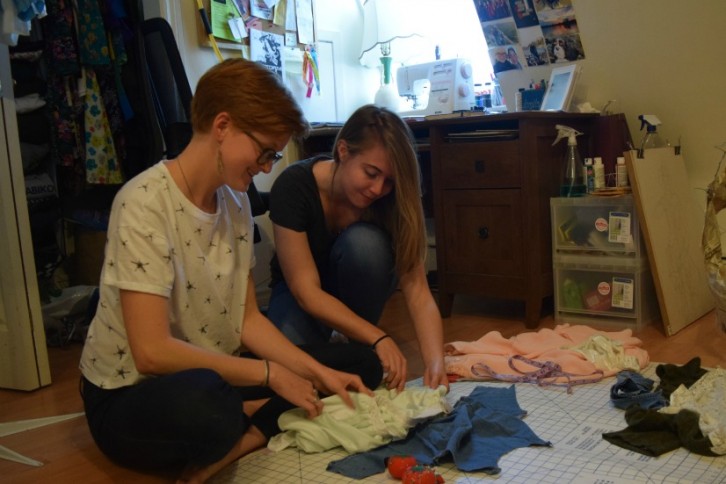Fashion
Local designer making inclusive fashions for real people
Perfect Mischief brand created to bring feminine designs to all genders and body types

caption
Donelle Fraser, designer for Perfect Mischief, working with recycled fabric.
caption
Donelle Fraser, designer for Perfect Mischief, working with recycled fabric.Picture a runway fashion show — what do you see?
It would be no surprise if a line of thin, sculpted female models strutting down a catwalk is the first image that comes to mind.
Donelle Fraser, designer of new Halifax brand Perfect Mischief, invites locals to take part in a fashion experience that is inclusive and fun — for everyone.
Fraser, a fourth-year Dalhousie student studying sustainability and international development, began selling her clothing at Plan B on Gottingen Street last Friday. She markets the brand as “one-of-a-kind femme fashions for all genders and bodies.”
Fraser works by-hand to reconstruct items from recycled clothing, adding materials such as lace and floral.
Perfect Mischief’s marketing director and Dalhousie management student, Emily Brown, explains the brand’s name: “the ‘perfect’ part is sort of to describe the cuteness, the daintiness. The ‘mischief’ alludes to a kind of twist, a differentness, to that.”
The ‘twist’ is a goal to deconstruct social norms.
“We’re trying to break out of the box that the fashion industry puts so many people in, saying ‘this is womenswear and this is how you wear it,’” Fraser said.
She chooses models of all sizes and genders. “The clothing is typically feminine but we’ve focused on having males model it and I’ve had a transgender model,” she said.
“I don’t pick my models based on body size at all.”

caption
Donelle Fraser (left) and Emily Brown review materials in Fraser’s home studio.Exclusivity is mainstream
“The [fashion] industry can be so, so harmful to so many people in the way that it promotes this idealized figure of a person that so many people feel like they have to live up to,” Fraser said.
Within the last three years, popular clothing brands including Lululemon, Abercrombie & Fitch and Brandy Melville have faced scrutiny for accusations of exclusivity and body-shaming.
Carmella Farahbakhsh, administrative co-ordinator at South House, a sexual and gender resource centre, believes fashion can be exclusive. Farahbakhsh, who uses the pronoun ‘they,’ says affirming one’s identity through fashion is not a safe option for many individuals.
“Trans and gender non-conforming folks don’t have the luxury of wearing whatever they want and not facing harassment, harm and violence,” they said.
Farahbakhsh extends this statement to people who have figures that do not match thin, societally-created ideals.
“There is not as much energy or [as many] resources put into making exciting clothing for people who don’t have normative bodies,” Farahbakhsh said.
“It’s an isolating process. So it’s really rad when folks start to politicize fashion or to reclaim space in the fashion industry within their own communities and within themselves. But I think that takes a lot of incredible acts of resistance,” they said.
Celebrating real bodies
Fraser knows that the fashion industry often chooses not to reflect reality. She insists that her brand does.
“I like viewing things that might be seen as imperfections in the mainstream fashion industry as things that are special and that should be celebrated,” she said.
Fraser and Brown do not want to market their clothing as flattering.
Brown said, “We want it to say, ‘hey, you look great, you make that outfit shine.”


N
Nancy Reid